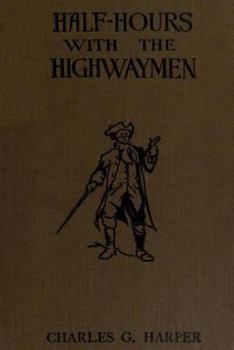Half-hours with the Highwaymen
Select Format
Select Condition 
Book Overview
EXTRAIT: When Harrison Ainsworth wrote Rookwood, that fantastic romance of highway robbery and the impossible exploits of the Rookwood family, he did a singular injustice to a most distinguished seventeenth-century highwayman, John Nevison by name, and transferred the glory of his wonderful ride to York to Dick Turpin, who never owned a "Black Bess," and who never did anything of the kind. Turpin, by virtue of Ainsworth's glowing pages, has become a popular hero and stands full in the limelight, while the real gallant figure is only dimly seen in the cold shade of neglect. John or "William" Nevison, by some accounts, was born at Pontefract, in 1639, of "honest and reasonably-estated parents." Sometimes we find him styled Nevison, at other times he is "alias Clerk" in the proclamations issued, offering rewards for his arrest. Occasionally, in the chap-books, we find John Nevison and William Nevison treated as two separate and distinct persons, no doubt because the recorded adventures of this truly eminent man were so widely distributed over the country, that it was difficult to believe them the doings of one person. But there seems to be no reasonable doubt that one and the same man was the hero of all these doings, as also of the famous Ride to York. Of course it is now by far too late to snatch from Turpin the false glory bestowed upon him. A hundred romances, a century of popular plays, have for ever in the popular mind identified him with the Ride to York, and with all manner of achievements and graces that were never his. Lies are brazen and immortal; truth is modest; and the Great Turpin Myth is too fully established to be thoroughly scotched. Charles George Harper (1863 - 1943) was an English author and illustrator. Born in London, England, Harper wrote many self-illustrated travel books, exploring the regions, roads, coastlines, literary connections, old inns etc. of Britain. In later life, he lived in Petersham. Aside from the some 170 topographical works, he also wrote a few books on drawing and its techniques, including English Pen Artists of To-day (1892) and A Practical Handbook of Drawing for Modern Methods of Reproduction (1894), as well as an anti-feminist polemic, Revolted Woman; past, present, and to come (1894), and a satirical novel, Hearts Do Not Break: a Tale of the Lower Slopes (1896), attacking logrolling among the London literary set. Critical assessment R. E. D. Sketchley's English book-illustration of to-day (1903) characterised Harper's travel books as "... written and drawn with spirited observation. His drawing is not so picturesque as his writing. It has reticence and justness of expression that would not serve in relating tales of the road, but which, together with a sense of colour and of what is pictorial, combine to form an effective and frequently distinctive style of illustration". N. W. Webster's article The English traveller describes him as "more a capable draughtsman than a creative artist, although his books would lose much without his delightful sketches".
Format:Paperback
Language:English
ISBN:1539515893
ISBN13:9781539515890
Release Date:October 2016
Publisher:Createspace Independent Publishing Platform
Length:308 Pages
Weight:0.91 lbs.
Dimensions:0.6" x 6.0" x 9.0"
Customer Reviews
0 rating





